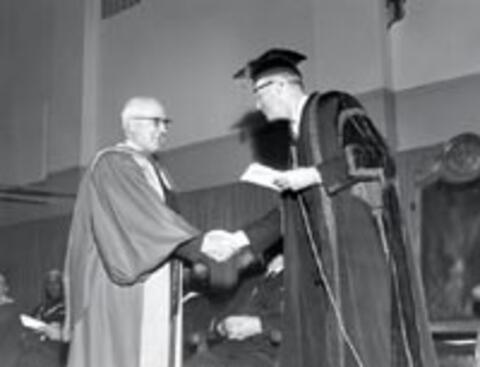
Zone du titre et de la mention de responsabilité
Titre propre
Honourary Degrees - Presentation - Emmett M. Hall
Dénomination générale des documents
- Document graphique
Titre parallèle
Compléments du titre
Mentions de responsabilité du titre
Notes du titre
Niveau de description
Pièce
Cote
Zone de l'édition
Mention d'édition
Mentions de responsabilité relatives à l'édition
Zone des précisions relatives à la catégorie de documents
Mention d'échelle (cartographique)
Mention de projection (cartographique)
Mention des coordonnées (cartographiques)
Mention d'échelle (architecturale)
Juridiction responsable et dénomination (philatélique)
Zone des dates de production
Date(s)
-
12 May 1964 (Production)
Zone de description matérielle
Description matérielle
1 photograph : b&w ; 25.4 x 20.5 cm
1 negative : b&w ; 12.5 x 10.0 cm
Zone de la collection
Titre propre de la collection
Titres parallèles de la collection
Compléments du titre de la collection
Mention de responsabilité relative à la collection
Numérotation à l'intérieur de la collection
Note sur la collection
Zone de la description archivistique
Nom du producteur
Historique de la conservation
Portée et contenu
E.M. (Ted) Culliton, University Chancellor, making presentation of an honourary Doctor of Civil Law degree to Justice Emmett M. Hall at Convocation held in Physical Education gymnasium.
Bio/Historical Note: Emmett Matthew Hall was born in 1898 in Saint-Colomban, Quebec, His family moved to Saskatoon in 1910, when Hall was age 12, to take over a dairy farm. Hall was in the audience on 29 July 1910, when Prime Minister Wilfrid Laurier laid the cornerstone for the University of Saskatchewan. Hall studied law at the College of Law at the University of Saskatchewan, putting himself through by teaching French in local schools. One of his classmates was John Diefenbaker, future Prime Minister of Canada. He received his law degree from the U of S in 1919. Hall was called to the bar in 1922 and spent the next 35 years in private practice. He became a leading litigator in the Saskatchewan bar. Hall earned a reputation as a civil libertarian after serving as co-counsel in defending 24 unemployed on-to-Ottawa trekkers who were charged in the 1935 Regina Riot. In 1935, Hall was appointed King’s Counsel. He was elected a bencher of the Law Society of Saskatchewan, becoming President of the Law Society in 1952. He also taught law at the College of Law at the U of S. Appointed by John Diefenbaker in 1961 to chair a royal commission on Canada’s health care system, Hall issued a report in 1964 that went beyond Saskatchewan’s pioneering medicare legislation and recommended wider benefits, such as free prescription drugs for seniors and dental care for school children and people on social assistance. He is considered one of the fathers of the Canadian system of Medicare, along with his fellow Saskatchewanian, Tommy Douglas. Lester Pearson’s government adopted many of Hall’s recommendations and implemented a national health plan in 1968 that was cost-shared with provinces. Named to the Supreme Court in 1962, Hall’s lasting judicial legacy is in the area of Aboriginal law. Particularly noteworthy is his strong dissent in R v Calder, regarding Nisga’a title to territory. His view that Aboriginal title existed through centuries of occupation and could be extinguished only through surrender or by competent legislative authority is credited with influencing modern land claims settlements across Canada. Hall was awarded an honourary Doctor of Civil Law degree by the U of S in 1962. Hall served as the chancellor of two different universities: the University of Guelph, from 1971 to 1977, and the U of S, from 1979 to 1986. By a quirk of fate, he followed two former leaders of the federal Progressive Conservative party in the two positions. His predecessor as chancellor of Guelph was George Drew, who led the party from 1948 to 1956. At Saskatchewan, Hall succeeded his old law school chum, John Diefenbaker, who died in 1979. On his retirement from the Supreme Court in 1974, Hall was made a Companion of the Order of Canada, "for a lifetime of service to the law and for his contributions to the improvement of health services and education." Hall died in Saskatoon at age 96 in 1995.
Zone des notes
État de conservation
Source immédiate d'acquisition
Classement
Langue des documents
Écriture des documents
Localisation des originaux
Disponibilité d'autres formats
Restrictions d'accès
Délais d'utilisation, de reproduction et de publication
Photographer: Gibson
Other terms: Copyright: University of Saskatchewan

